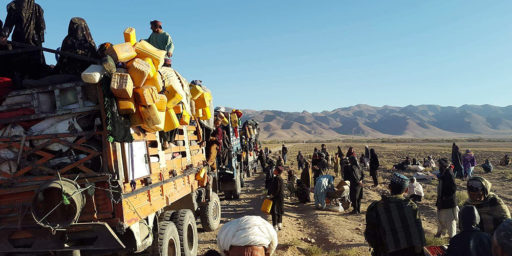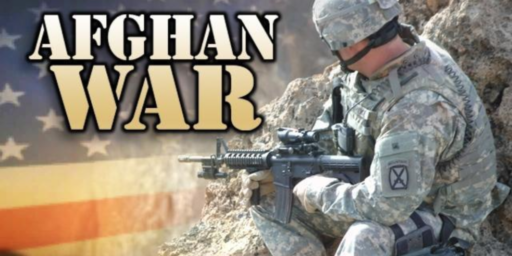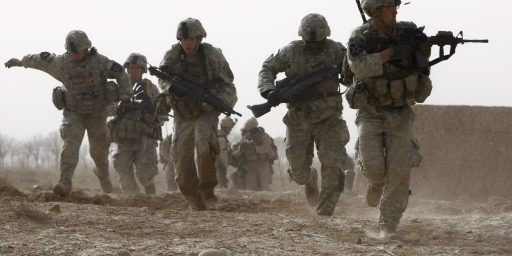OTB Roundtable: Afghanistan
Yesterday President Obama addressed the graduating cadets at West Point. The full transcript is here. As was proper and should have been expected, Afghanistan occupied a prominent place in the speech:
This is the ninth consecutive commencement that has taken place at West Point with our nation at war. This time of war began in Afghanistan — a place that may seem as far away from this peaceful bend in the Hudson River as anywhere on Earth. The war began only because our own cities and civilians were attacked by violent extremists who plotted from a distant place, and it continues only because that plotting persists to this day.
[…]
We face a tough fight in Afghanistan. Any insurgency that is confronted with a direct challenge will turn to new tactics. And from Marja to Kandahar, that is what the Taliban has done through assassination and indiscriminate killing and intimidation. Moreover, any country that has known decades of war will be tested in finding political solutions to its problems, and providing governance that can sustain progress and serve the needs of its people.
Inspired by this speech and by Doug’s recent post here noting the 1,000th U. S. military death in Afghanistan, I determined to organize a round table discussion among the OTB bloggers of the situation in Afghanistan and their policy preferences. Over the next several days you can expect a number of my colleagues here to join in the discussion.
The situation in Afghanistan was summarized well by President Obama the last time he addressed the cadets at West Point in December of 2009:
Al Qaeda’s base of operations was in Afghanistan, where they were harbored by the Taliban — a ruthless, repressive and radical movement that seized control of that country after it was ravaged by years of Soviet occupation and civil war, and after the attention of America and our friends had turned elsewhere.
Just days after 9/11, Congress authorized the use of force against al Qaeda and those who harbored them — an authorization that continues to this day. The vote in the Senate was 98 to nothing. The vote in the House was 420 to 1. For the first time in its history, the North Atlantic Treaty Organization invoked Article 5 — the commitment that says an attack on one member nation is an attack on all. And the United Nations Security Council endorsed the use of all necessary steps to respond to the 9/11 attacks. America, our allies and the world were acting as one to destroy al Qaeda’s terrorist network and to protect our common security.
Under the banner of this domestic unity and international legitimacy — and only after the Taliban refused to turn over Osama bin Laden — we sent our troops into Afghanistan. Within a matter of months, al Qaeda was scattered and many of its operatives were killed. The Taliban was driven from power and pushed back on its heels. A place that had known decades of fear now had reason to hope. At a conference convened by the U.N., a provisional government was established under President Hamid Karzai. And an International Security Assistance Force was established to help bring a lasting peace to a war-torn country.
At that time he re-affirmed the U. S.’s commitment to Afghanistan and outlined our strategy there:
And as Commander-in-Chief, I have determined that it is in our vital national interest to send an additional 30,000 U.S. troops to Afghanistan. After 18 months, our troops will begin to come home.
[…]
I make this decision because I am convinced that our security is at stake in Afghanistan and Pakistan. This is the epicenter of violent extremism practiced by al Qaeda. It is from here that we were attacked on 9/11, and it is from here that new attacks are being plotted as I speak. This is no idle danger; no hypothetical threat. In the last few months alone, we have apprehended extremists within our borders who were sent here from the border region of Afghanistan and Pakistan to commit new acts of terror.
[…]
These are the three core elements of our strategy: a military effort to create the conditions for a transition; a civilian surge that reinforces positive action; and an effective partnership with Pakistan.
I urge you to read both of President Obama’s speeches cited above in full; they are both good, as President Obama’s speeches frequently are.
These are the facts on Afghanistan, at least as seen through American eyes. My colleagues and I will outline our opinions in separate posts.






